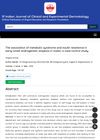 4 citations,
August 2018 in “Clinical Endocrinology”
4 citations,
August 2018 in “Clinical Endocrinology” Women with PCOS have more insulin resistance and are more likely to have heart-related health issues, with insulin resistance being a bigger factor than β-cell problems.
 3 citations,
May 2019 in “Ginekologia Polska”
3 citations,
May 2019 in “Ginekologia Polska” Adolescents with abnormal uterine bleeding often have polycystic ovarian syndrome and insulin resistance.
3 citations,
February 2002 in “The American journal of psychiatry” Stopping birth control pills may have triggered a manic episode in a woman with HAIR-AN syndrome.
 2 citations,
January 2016 in “Journal of Steroids & Hormonal Science”
2 citations,
January 2016 in “Journal of Steroids & Hormonal Science” Women with PCOS and polycystic ovaries have higher male hormone levels and more insulin resistance, especially if they are overweight.
 1 citations,
May 2013 in “Journal of the Egyptian Women's Dermatologic Society (Print)”
1 citations,
May 2013 in “Journal of the Egyptian Women's Dermatologic Society (Print)” Women with idiopathic hirsutism and PCOS have higher RBP4 levels, and PCOS is linked to greater insulin resistance; weight management may help both conditions.
 May 2022 in “Maǧallaẗ Buḥūṯ Al-Tarbiyyaẗ Al-Nawʿiyyaẗ (Print)”
May 2022 in “Maǧallaẗ Buḥūṯ Al-Tarbiyyaẗ Al-Nawʿiyyaẗ (Print)” Eating a high inositol diet significantly improves insulin resistance and hormone levels in women with PCOS.
 October 2021 in “Journal of Advanced Biomedical and Pharmaceutical Sciences”
October 2021 in “Journal of Advanced Biomedical and Pharmaceutical Sciences” Vitamin D helps improve PCOS by aiding insulin function and ovarian health.
 June 2021 in “International Journal of Research in Dermatology”
June 2021 in “International Journal of Research in Dermatology” Women with acne and PCOS should be checked for insulin resistance and related symptoms.
December 2019 in “Orvostudományi Értesítö” Lifestyle changes, medications, and fertility treatments can improve PCOS symptoms and prevent complications.
 12 citations,
December 2005 in “PubMed”
12 citations,
December 2005 in “PubMed” Some men with early hair loss may have similar hormonal changes to women with Polycystic ovary syndrome, and could be at risk for developing type 2 diabetes.
 January 2017 in “IP Indian journal of clinical and experimental dermatology”
January 2017 in “IP Indian journal of clinical and experimental dermatology” Early-onset male baldness is not linked to insulin resistance, but is significantly associated with metabolic syndrome.
 5 citations,
June 2018 in “Journal of Diabetes, Metabolic Disorders & Control”
5 citations,
June 2018 in “Journal of Diabetes, Metabolic Disorders & Control” Women with PCOS may have higher bad cholesterol and are at risk for blood sugar issues; lifestyle changes are recommended.
 February 2022 in “Mediators of Inflammation”
February 2022 in “Mediators of Inflammation” Women with Polycystic Ovary Syndrome (PCOS) have lower levels of a substance called DIAPH1 in their blood, which is linked to changes in sugar metabolism and insulin resistance.
 135 citations,
March 1984 in “Fertility and sterility”
135 citations,
March 1984 in “Fertility and sterility” Higher levels of unbound testosterone are linked to increased insulin resistance, especially in women with polycystic ovary syndrome.
 44 citations,
May 2008 in “Fertility and Sterility”
44 citations,
May 2008 in “Fertility and Sterility” Insulin resistance might not be enough to worsen blood vessel function in young, nonobese women with polycystic ovary syndrome.
39 citations,
August 2001 in “Clinical endocrinology” Lean and obese women with PCOS have similar levels of insulin resistance, indicating it's a core aspect of the condition.
1947 citations,
September 1995 in “New England journal of medicine/The New England journal of medicine” PCOS is a common hormonal disorder causing irregular periods and increased hair growth, linked to insulin resistance and long-term health issues.
 198 citations,
July 2011 in “Cochrane library”
198 citations,
July 2011 in “Cochrane library” Lifestyle changes can improve body composition, excess male hormone levels, and insulin resistance in women with PCOS.
 149 citations,
December 2007 in “The Journal of Clinical Endocrinology and Metabolism”
149 citations,
December 2007 in “The Journal of Clinical Endocrinology and Metabolism” Women with PCOS have overall higher body fat, not abnormal fat placement, and more insulin resistance.
 61 citations,
January 2015 in “Hormones”
61 citations,
January 2015 in “Hormones” Liraglutide caused significant weight loss in some obese women with PCOS, especially those with severe obesity and insulin resistance.
 60 citations,
February 2010 in “Gynecological Endocrinology”
60 citations,
February 2010 in “Gynecological Endocrinology” Metformin combined with lifestyle changes improves insulin resistance and reduces testosterone levels in women with PCOS more than lifestyle changes alone.
 56 citations,
July 2008 in “European journal of endocrinology”
56 citations,
July 2008 in “European journal of endocrinology” Metformin and rosiglitazone improve blood vessel function in women with PCOS, with metformin also reducing insulin resistance and testosterone levels.
 53 citations,
December 2015 in “JAMA Dermatology”
53 citations,
December 2015 in “JAMA Dermatology” Women with PCOS often have more body hair, acne, and skin darkening, and these signs are linked to metabolic issues like insulin resistance and high cholesterol.
 32 citations,
June 2019 in “Frontiers in Endocrinology”
32 citations,
June 2019 in “Frontiers in Endocrinology” Polycystic Ovary Syndrome (PCOS) is common in women with conditions like anovulation, hirsutism, hair loss, and type 2 diabetes, and it can lead to health risks like heart disease, obesity, insulin resistance, and depression. Non-Classic Congenital Adrenal Hyperplasia (NC-CAH) is also discussed.
 31 citations,
January 2014 in “Clinical Endocrinology”
31 citations,
January 2014 in “Clinical Endocrinology” The study suggests that being overweight or obese, not PCOS itself, is strongly linked to insulin resistance.
 26 citations,
August 2014 in “Genetic Testing and Molecular Biomarkers”
26 citations,
August 2014 in “Genetic Testing and Molecular Biomarkers” High levels of TNF-α may contribute to obesity and insulin resistance in PCOS, but not due to the C850T genetic variation.
 22 citations,
June 2017 in “Advances in Clinical and Experimental Medicine”
22 citations,
June 2017 in “Advances in Clinical and Experimental Medicine” Polycystic ovary syndrome (PCOS) was first described in 1721, officially diagnosed in the 1990s, and is now known to be partly genetic and linked to insulin resistance, with increased risk of cardiovascular disease and carbohydrate metabolism issues.
 19 citations,
October 2004 in “Best Practice & Research in Clinical Obstetrics & Gynaecology”
19 citations,
October 2004 in “Best Practice & Research in Clinical Obstetrics & Gynaecology” The diagnosis of polycystic ovary syndrome (PCOS) requires a detailed patient history, ultrasound scanning, hormone level checks, and assessments of ovulation, obesity, and insulin resistance. It's a variable condition that needs individualized management and is a significant risk factor for type 2 diabetes.
 18 citations,
December 2010 in “The Journal of Steroid Biochemistry and Molecular Biology”
18 citations,
December 2010 in “The Journal of Steroid Biochemistry and Molecular Biology” Increased HSD11B1 enzyme expression is linked to higher body fat and insulin resistance.
 16 citations,
May 2019 in “Hormone and Metabolic Research”
16 citations,
May 2019 in “Hormone and Metabolic Research” Selenium might help with insulin resistance and cholesterol in PCOS, but more research is needed to confirm its benefits.

























